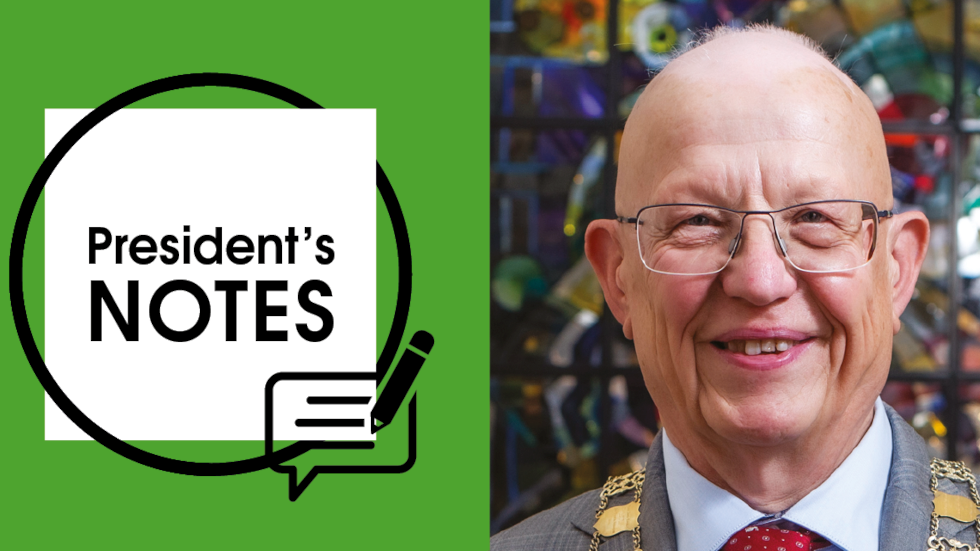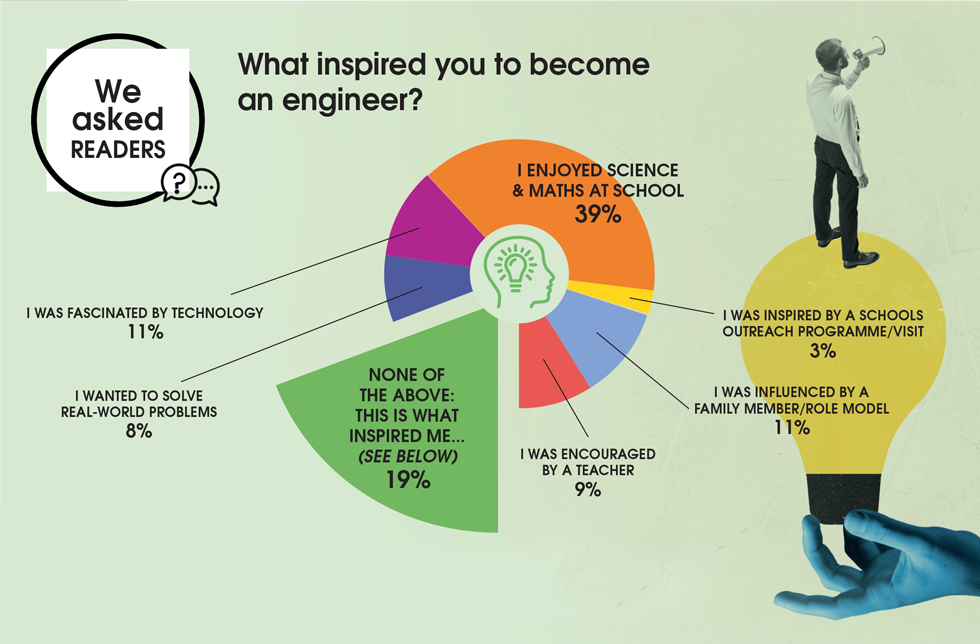IChemE Matters – May 2024

Meetings of minds
It’s been a busy few weeks with some very interesting conversations and meetings taking place. Among them was a meeting with the senior team of the Dalton Nuclear Institute and director Zara Hodgson to hear about new nuclear technologies and the implications of the UK’s Nuclear Roadmap. I’ve also been finalising my keynote address to CHEMUK, which takes place on 15 and 16 May, and I hope to meet many of you there.
I was pleased to hear IChemE’s involvement in a digital news-style programme produced by ITN Business is now confirmed. “Engineering: Today, Tomorrow & Beyond” will launch on National Engineering Day, 6 November 2024, and explore the positive work currently underway across the spectrum of engineering disciplines, and increase awareness of the vast range of career opportunities within the engineering sector.
There has been lots of member interest following the exciting announcement of our joint hydrogen webinar series with the American Institute of Chemical Engineers (AIChE). This partnership is focused on advancing our shared interest in championing hydrogen knowledge transfer and accelerating the development of applications that can play a crucial role in the global transition to net zero. The webinars launch in the second quarter of 2024, so keep an eye on your monthly Member News emails or the IChemE website for information about how to book. I’m also looking forward to meeting the AIChE board and CEO when they visit the UK in a few weeks. Our planned series of annual hydrogen conferences, kicking off in 2025, will be high on the agenda.
If you’re yet to renew your IChemE membership, you should do so straight away to maintain your registration and enjoy uninterrupted access to a fantastic selection of exclusive member resources. The recent launches of IChemE Connect and our career mentoring pilot scheme are great examples of how IChemE is continually focusing on giving members the chance to connect with like-minded professionals. Members can also access IChemE’s new salary survey report and salary calculator tool by heading to https://www.icheme.org/salary-survey
I always welcome any feedback, and value any input or ideas you would like to share – you can contact me at president@icheme.org

Chemical engineering and Practical Action
A member wrote to us alerting us to a chemical engineering charity in need of support – and one, remarkably, just a stone’s throw from where this magazine is produced...
Most members of IChemE know that its HQ is in Rugby, but few will know that a few minutes’ walk away is the HQ of a charity called Practical Action. This charity helps communities to help themselves through training and the application of small-scale technology. Back in the late 1960s, they were known as the Intermediate Technology Development Group. Their ethos is that “big change starts small”.
In those days, chemical engineering was mostly about large-scale and high-tech plants. Things have changed a lot since then. The scope of chemical engineering is much wider.
Browsing the many free resources available in their knowledge centre, I was particularly struck by a project describing how to build a small-scale treatment plant to take groundwater containing arsenic and iron and make it potable. Four modest-sized tanks were needed and were built as a block of four. In the first, air was introduced, causing the arsenic and iron to precipitate. The next two were for filtration and the fourth for storage. Quality control was provided by guava leaves; if the water darkens after 30 to 60 seconds then the water is unsafe. This is a very neat piece of chemical engineering, albeit very different from anything I have seen before: https://bit.ly/4aPTa8e
There are more than 1,000 projects described on their website and I have not yet got past the first 200. Suffice to say, there are areas in which chemical engineering expertise can help. This might be through chemical engineering departments sharing research, or even some link between Practical Action and IChemE. I think we have unique expertise to provide. I also think that there are ways in which Practical Action’s work might benefit our teaching.
Their website is well worth looking at, and like all charities they need support: https://practicalaction.org/
Malcolm Henry

On IChemE Connect
Do you have any insights on the history of process safety education? If so, you could help Maureen Hassall, director of the Minerals Industry Safety and Health Centre at the University of Queensland, who has posted on the All Member Open Forum asking for help.
“I am conducting research into ICI’s contribution to process safety related hazard and risk management education. I am interested in hearing about early ICI courses (up until 2000) and reviewing any course notes that still exist. If you have any information that you think might be helpful and that you’re willing to share, please let me know.”
“Simple question,” asks Karam Ben Mohamed on the All Member Open Forum: “Are you aware of any clear/unambiguous statement in any standard/code not allowing to have a check valve (non-return valve) in the inlet line of relief valve?”
Among a flurry of replies from members, were: “Just because there isn’t an explicit statement doesn’t mean it shouldn’t be considered poor practice…If, for some reason, you are particularly concerned about reverse flow through the relief valve, I would be looking at rupture discs in the inlet and/or outlet line suitably specified in relation to codes.”
Karam replied, sharing a schematic for an oil and gas gathering system, and advice he’d received from piping colleagues.
“Absolutely 100% never install a check in the inlet line to a relief valve…It is of course ok to install locked open valves in the inlet lines and that is completely normal,” another member replied.
A third advised: “Your system would appear to be vulnerable to blockage, if anything the check valves just provide a restriction that may exacerbate this. In my experience it is usually simpler and safer to place your overpressure protection upstream of the spec. break, in this case say on the production manifolds.”
To read these threads and contribute, login at: www.icheme.org/connect

None of the above – this is what inspired me:
"I was academically good at school, and I liked solving problems but what really made me determined was I was told that girls couldn’t be engineers.”
Andrea Hosey
“I decided to study chemical engineering after looking through one of IChemE’s whynotchemeng leaflets.”
Yasmin Ali
“My strongest subject was chemistry, but I really wanted a career that would allow me to work overseas, to live in and experience new countries and cultures. Chemical engineering truly delivered for me as I have spent the last 29 of 34 working years living overseas.”
David Knight
“I came to the UK at the age of 13. When I joined the school in London, I discovered the subject of chemistry for the first time. I previously did have a role model – my grandfather was a civil engineer, and I wanted to be an engineer. But now, I wanted to be an engineer that involved chemistry. I found an IChemE brochure in my school careers office (this is going back to 1967), and the rest is history! I have fully enjoyed my career as a chemical engineer.”
Utkarsha Joshi
“Actually, it’s more like most of the above. Dad was an engineer; my physics teachers encouraged engineering; my school sent me on a couple of “girls into engineering” type events; and I spoke to a female chemical engineer at a careers event at school. I wasn’t particularly fascinated by technology or real-world problems though – it just seemed like chemical engineering was a good place for a girl who liked science and maths.”
Sarah Collins
“I went on a careers week with British Gas which included a trip around an operating processing plant and the thought of running one of those appealed to me.”
Terry Page
“I loved taking things apart to understand how they worked. There was a big chemical plant near where we lived, and I was fascinated by the distillation columns and other pieces of equipment and wanted to work there!
Wendy Wilson
Recent Editions
Catch up on the latest news, views and jobs from The Chemical Engineer. Below are the four latest issues. View a wider selection of the archive from within the Magazine section of this site.




